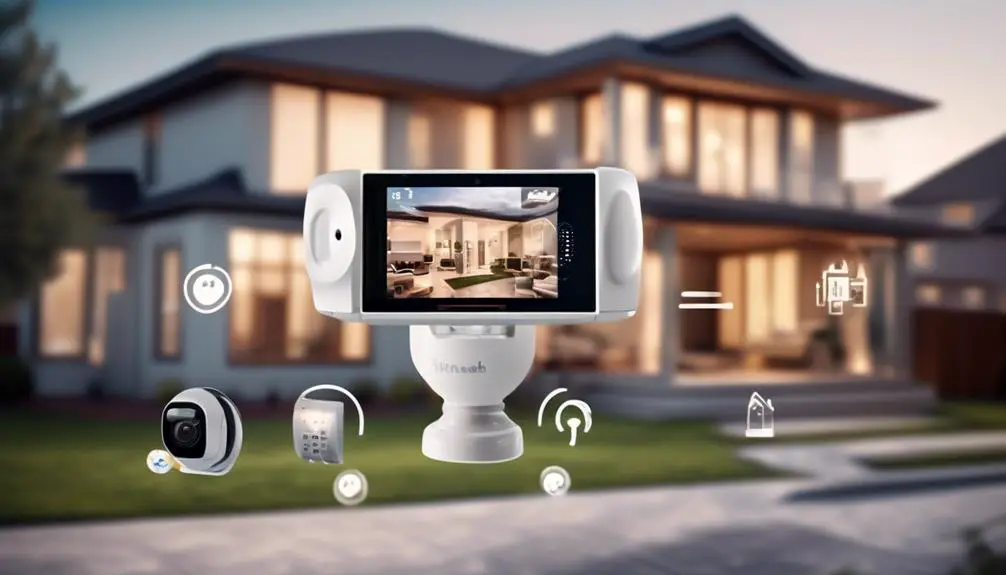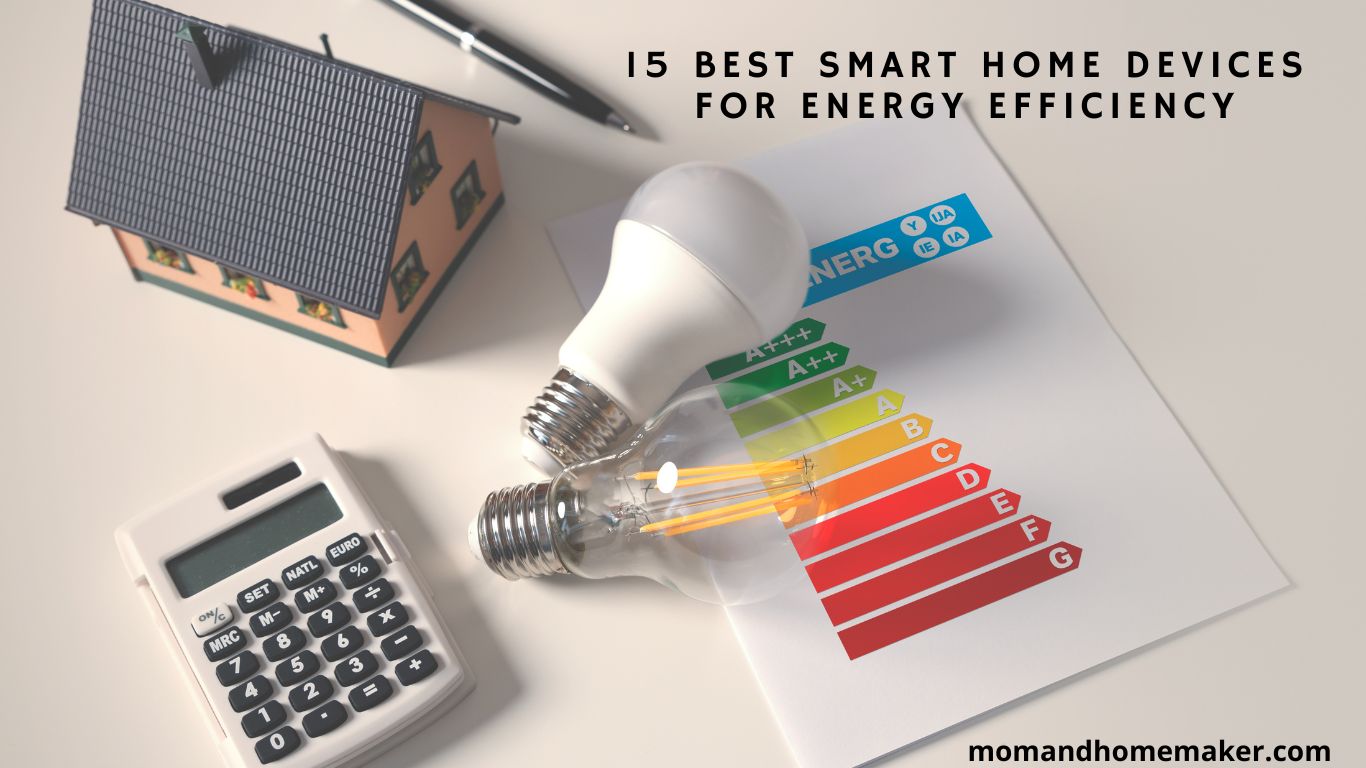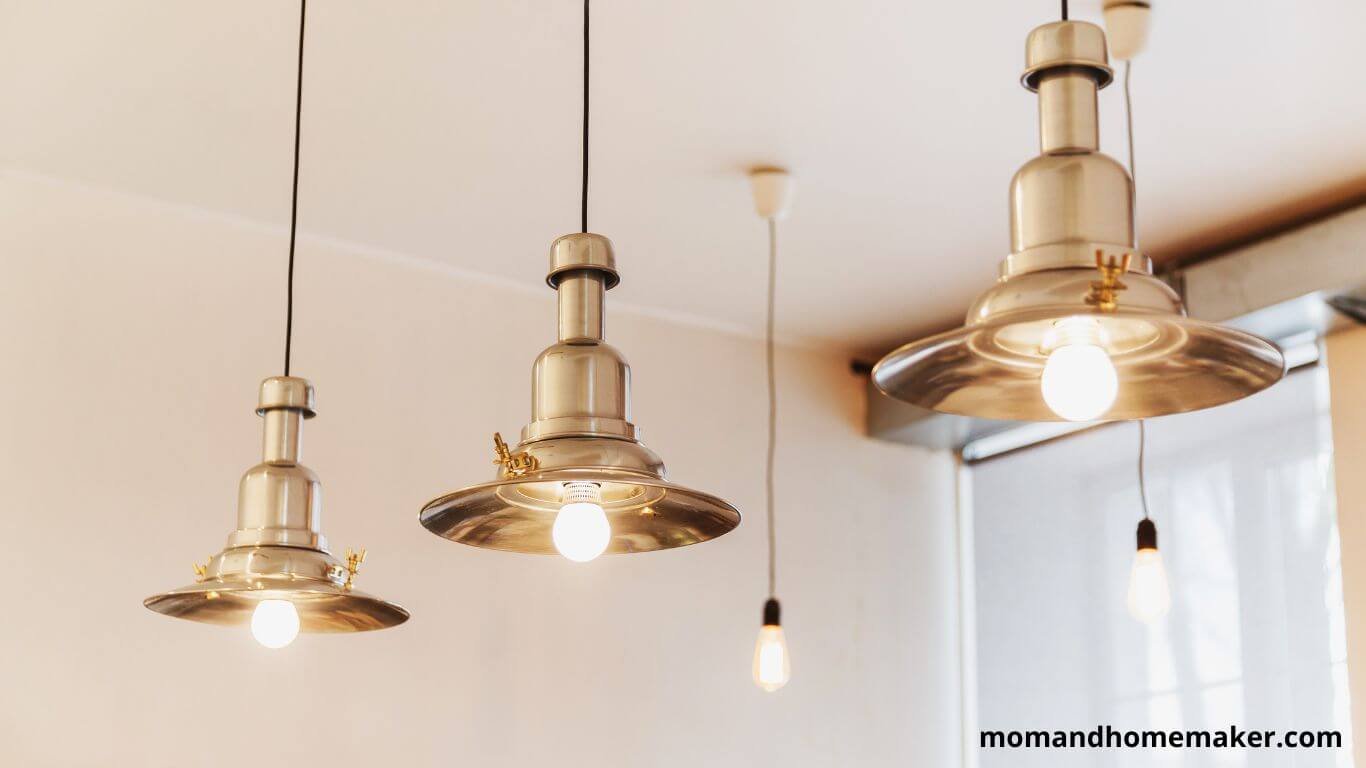The intersection of home technology and home insurance premiums has become a focal point in the realm of modern homeownership.
With the increasing adoption of smart home devices and interconnected systems, insurance companies are reevaluating their premium structures to account for the risk mitigation capabilities of these technologies.
As homeowners seek to protect their properties and assets, understanding the intricate relationship between home technology and insurance costs has become essential in navigating the evolving landscape of home insurance.
Rise in Smart Home Devices
The popularity of smart home devices is increasing, and this trend may have an impact on your insurance premiums. Voice-controlled devices like smart speakers and virtual assistants are in high demand, and smart home hubs are becoming more influential as a result.
These voice-controlled devices have revolutionized how we interact with our homes. They’re powered by artificial intelligence and allow us to easily control various aspects of our households with simple voice commands.
From adjusting the temperature to turning on the lights, these smart home hubs offer unparalleled convenience and efficiency. As a result, more and more homeowners are adopting this technology to simplify and connect their lives.
However, the rising popularity of smart home devices also brings about changes in the insurance industry. Insurance companies are recognizing the potential benefits of these devices in reducing risks and preventing accidents.
For example, smart home hubs can detect smoke or water leaks, alerting homeowners and potentially preventing significant damage. This proactive approach to home security and maintenance can lead to lower insurance claims and potentially lower premiums for homeowners.
Moreover, integrating smart home technology with security systems can enhance the overall safety of your home. With features like remote surveillance and real-time alerts, homeowners can have peace of mind knowing that their property is well-protected. Insurance companies may view this as a positive factor, as it reduces the likelihood of break-ins and theft, which could also result in lower insurance premiums.
Integration of Security Systems
When it comes to the impact of smart home devices on your insurance premiums, it’s crucial to consider the integration of security systems and how it can enhance your home’s safety and protection.
Integrating home security systems into your smart home setup can have a significant effect on your insurance costs for several reasons.
Integrating security systems with other smart home devices like cameras, motion sensors, and door/window sensors provides you with increased peace of mind. This comprehensive security network allows for round-the-clock protection and remote monitoring and control of your security system. Whether you’re at home or away, you can rest easy knowing that your home is secure.
Integrating your security systems with a monitoring service can lead to faster response times in case of a break-in or emergency. When a security breach is detected, the monitoring service can immediately alert the appropriate authorities.
This swift response can potentially prevent further damage or loss and increase the chances of apprehending the intruder. By minimizing the impact of a security incident, you can protect your property and belongings more effectively.
To make the most of these benefits, consider choosing high-quality security systems that seamlessly integrate with your smart home setup. Look for systems that offer advanced features like facial recognition, real-time alerts, and cloud storage for video footage. These specific examples can further enhance the effectiveness of your security system and provide an extra layer of protection for your home.
Surveillance Cameras and Insurance Costs
Integrating surveillance cameras into your smart home setup can lead to potential reductions in insurance costs while enhancing the security of your property. Surveillance cameras are highly effective in deterring criminals.
The presence of visible cameras can discourage burglars from targeting your property altogether. Knowing that they’re being monitored increases the risk of getting caught, making your home less attractive to potential intruders. This added layer of security gives you peace of mind, knowing that your property is being protected.
In the unfortunate event of a break-in, surveillance cameras provide valuable evidence. The footage captured by these cameras can help identify the intruders and aid in their prosecution. This evidence can also assist in recovering stolen items and increasing the chances of a successful insurance claim.
Insurance companies recognize the importance of these devices in protecting your home and are willing to offer discounts on your premiums as a result.
Privacy concerns surrounding surveillance cameras are understandable. However, advancements in technology have allowed for features that address these concerns. For example, many cameras offer customizable privacy settings, such as motion detection zones and the ability to schedule when the cameras are active. These features allow you to maintain your privacy while still benefiting from the added security.
Impact of Smart Locks and Alarms
Smart locks and alarms are advanced home security devices that offer improved protection for your property. These innovative technologies have a significant impact on the security of your home and can help reduce the risk of burglaries.
Here are some important points to consider:
- Enhanced Security: Smart locks and alarms provide an additional layer of security for your home. With features like facial recognition technology, these devices can identify authorized individuals and grant them access while keeping intruders out. This advanced technology ensures that only trusted individuals can enter your property, giving you peace of mind and a sense of belonging in your own home.
- Reduced Burglary Rates: The impact of smart locks in reducing burglary rates can’t be overstated. These devices act as a strong deterrent to potential burglars, as they’re difficult to bypass and can send instant alerts to your smartphone or security provider in case of any unauthorized entry attempts. This added layer of protection significantly reduces the chances of your home being targeted by criminals, making you feel more secure and part of a safe community.
- Insurance Premium Discounts: Installing smart locks and alarms in your home can also lead to lower insurance premiums. Insurance companies recognize the enhanced security these devices provide and often offer discounts to homeowners who’ve them installed. By taking advantage of these technologies, not only do you protect your property but also save money on your insurance costs, increasing your sense of belonging and financial security.
Home Automation Systems and Premiums
Home automation systems can have a significant impact on your insurance premiums. If you have invested in smart home automation, you might be wondering how it can affect your home insurance rates. The good news is that having a home automation system can potentially lower your premiums.
Insurance companies see home automation systems as an extra layer of security for your home. These systems, which include smart locks, security cameras, and motion sensors, can help protect your property from theft, fires, and other risks. By providing additional protection, home automation systems can reduce the likelihood of filing a claim, resulting in lower insurance premiums.
With a smart home automation system, you can monitor your home remotely and receive real-time alerts on your smartphone. This allows you to take immediate action in case of any suspicious activities or emergencies.
Insurance companies view this as proactive risk management, giving them confidence that you actively protect your home. As a result, they may offer you lower premiums as a reward for your proactive approach.
Moreover, some insurance providers offer discounts specifically for homeowners with home automation systems. These discounts can vary depending on the type and extent of your automation system, so it’s worth discussing with your insurance agent to determine if you qualify for any potential savings.
Smart Thermostats and Energy Efficiency
Installing a smart thermostat in your home can greatly improve energy efficiency and lower your utility costs. The advanced features and automation capabilities of a smart thermostat offer several benefits that can have a positive impact on both the environment and your wallet.
One of the key advantages of a smart thermostat is the convenience and comfort it provides. You can control the temperature of your home remotely through a smartphone app, ensuring that you come back to a cozy and perfectly heated home after a long day.
This sense of belonging and a warm welcome can make a big difference in your daily life. Additionally, some smart thermostats have learning capabilities, adapt to your routine and preferences. They can automatically adjust the temperature to provide optimal comfort without you having to lift a finger. It’s like having a personal assistant dedicated to your comfort.
In terms of cost savings, a smart thermostat allows you to set schedules and temperature limits to optimize energy usage. This can result in significant savings on your utility bills. Knowing that you’re saving money while also reducing your environmental impact can create a sense of pride and fulfillment.
Furthermore, many energy companies offer special incentives and rebates for installing a smart thermostat, which not only saves you money upfront but also reinforces the feeling of belonging to a community that values energy efficiency.
Investing in a smart thermostat is a smart choice for both your comfort and your wallet. With its convenience, cost savings, and environmental benefits, it’s a win-win situation. So why wait? Upgrade to a smart thermostat and start enjoying the benefits today.
Water Leak Detection and Insurance Rates
Lowering your insurance rates can be as simple as installing water leak detection systems in your home. Water leaks have the potential to cause extensive damage, leading to costly repairs and disruptions to your daily life. By investing in water leak detection technology, you can take proactive measures to prevent water damage and reduce the risk of insurance claims.
Water leak detection systems work by monitoring the water flow in your home and alerting you to any abnormalities or potential leaks. These systems use various sensors and detectors, such as moisture sensors, flow meters, and smart devices that can automatically shut off the water supply in the event of a leak.
By installing these systems, you can detect leaks early, allowing you to address the issue promptly and prevent further damage.
Insurance companies recognize the value of water leak detection systems in preventing water damage and may offer discounts on your premium if you have them installed. To determine if you qualify for any savings, it’s advisable to conduct an insurance coverage analysis with your insurance provider. This analysis will help you understand the specific requirements and potential savings associated with water leak detection systems.
In addition to potential insurance savings, implementing water leak detection systems can provide peace of mind. Knowing that you have taken proactive measures to protect your home from water damage can give you a sense of security and belonging. You can rest easy, knowing that you have done everything possible to safeguard your property and belongings.
Impact of Fire Detection Systems
Investing in home technology isn’t only a smart way to protect against water damage but it can also have a significant impact on your insurance premiums, especially when it comes to fire detection systems.
By installing a fire detection system in your home, you not only take proactive steps to prevent fires but also ensure that you receive early warnings in case of any potential danger. And here’s how fire detection systems can truly make a difference in your insurance premiums:
First and foremost, fire detection systems are designed to detect smoke or fire at its early stages, which allows you to take immediate action to prevent further damage.
This dedication to fire prevention is something that insurance companies highly value, and by installing a fire detection system, you’re demonstrating your commitment to keeping your home safe from fire hazards. This proactive approach to fire prevention can potentially lower your insurance premiums.
In addition to fire prevention, early warning is crucial in the unfortunate event of a fire. Fire detection systems provide timely alerts, allowing you to evacuate and call emergency services promptly. Insurance companies recognize the value of early warning systems in minimizing fire-related damages.
By investing in a fire detection system, you’re showing your dedication to safeguarding your home, which can lead to a reduction in your insurance premiums.
Owning a fire detection system not only provides you with peace of mind but also demonstrates your commitment to fire prevention and early warning. By taking these proactive measures, you’re actively contributing to the safety of your home and the well-being of your family.
Insurance companies appreciate homeowners who prioritize the protection of their properties, and by doing so, you may be eligible for discounted insurance rates.
Home Insurance Discounts for Smart Homes
Save on your home insurance premiums by embracing smart home technology. By investing in smart home security systems, you not only increase the safety of your home but also qualify for potential home insurance savings. Smart home technology offers advanced security features that can help protect your property and belongings, giving you peace of mind.
With smart home security systems like smart locks, doorbell cameras, and motion sensors, you can monitor and control access to your home remotely. These devices provide real-time alerts and allow you to view and interact with visitors even when you’re away. By having these security measures in place, you significantly reduce the risk of break-ins and theft, leading to lower home insurance premiums.
Insurance companies recognize the value of smart home technology in mitigating risks and preventing potential losses. As a result, many insurers offer home insurance discounts for homeowners who’ve implemented these systems. By taking advantage of these discounts, you not only save money but also enhance the security and protection of your home.
To ensure you receive the maximum home insurance savings, it’s important to inform your insurance provider about the smart home security systems you have installed. They can assess the level of protection these devices provide and adjust your premiums accordingly. Regularly reviewing and updating your policy can help you stay informed about any new discounts or incentives available.
Embracing smart home technology not only enhances your home’s security but also provides opportunities to save on your home insurance premiums. By investing in these advanced security systems, you not only protect your property and belongings but also demonstrate your commitment to creating a safe and secure living environment.
Wearable Technology and Home Insurance
By incorporating wearable technology into your home security measures, you can enhance the safety of your property and potentially qualify for additional home insurance benefits. Wearable technology, like smartwatches or fitness trackers, can provide valuable data to insurance companies and help them assess the risk associated with your home.
Here are some ways wearable technology can impact your insurance coverage:
- Reduced premiums: Insurance companies often offer discounts to homeowners who invest in wearable technology as part of their home security system. Wearables can provide real-time data on your physical activity, sleep patterns, and even heart rate, giving insurers insight into your overall health and well-being. This can result in lower premiums because insurance providers see individuals who prioritize their health as less likely to file a claim.
- Improved claims experience: In the unfortunate event of a break-in or other home security incident, wearable technology can provide valuable evidence to support your insurance claim. For instance, if your wearable device detects unusual activity or a sudden change in your heart rate, it can serve as proof of a traumatic event. This can streamline the claims process and ensure a faster resolution, providing you with peace of mind during a stressful time.
Impact of Connected Appliances
Connected appliances have transformed the way we interact with our homes, making them more efficient, convenient, and secure. This has had a significant impact on home insurance. With the increase in connected appliances, smart home technology has become a game-changer for insurance coverage.
These appliances, like smart thermostats, security systems, and kitchen appliances, offer numerous benefits that can lower insurance premiums and provide added security for your home.
One of the main advantages of connected appliances is their ability to monitor and detect potential risks. For instance, smart smoke detectors can automatically notify emergency services in case of a fire, resulting in faster response times and minimizing damage. This proactive approach to home safety is highly valued by insurance companies, leading to potential discounts for homeowners.
Connected appliances also contribute to energy efficiency, which is another factor that insurance providers consider. Smart thermostats, for example, allow you to control and schedule temperature settings remotely, helping to reduce energy consumption and lower utility bills.
Insurance companies recognize the positive environmental impact of these energy-saving devices and may offer incentives or discounts to homeowners who’ve them installed.
Furthermore, connected appliances can prevent accidents and minimize damage. Take smart water leak detectors, for instance. They quickly identify leaks and send alerts to your smartphone, enabling you to address the issue before it becomes a major problem. By taking proactive measures to prevent water damage, homeowners can reduce the likelihood of needing to file insurance claims and potentially qualify for lower premiums.
Home Insurance and Smart Home Assistants
Smart home assistants have revolutionized the way homeowners interact with their insurance policies, offering convenience and personalized assistance for managing coverage and claims. By integrating voice assistants like Amazon’s Alexa or Google Home, homeowners can easily access information about their home insurance policies and make changes or inquiries with a simple voice command. This technology not only saves time but also creates a sense of belonging and security for homeowners.
One reason why home insurance and voice assistants can make you feel more connected is through simplified access to information. Voice assistants allow homeowners to effortlessly retrieve details about their insurance policies, such as coverage, deductibles, and renewal dates. This accessibility helps homeowners feel more connected to their policies, knowing that they’ve immediate access to all the information they need.
Additionally, voice assistants can provide personalized recommendations based on the homeowner’s specific needs and circumstances.
Whether it’s suggesting additional coverage options or alerting homeowners about potential risks, these recommendations make homeowners feel understood and valued by their insurance providers. This personalized approach enhances the sense of connection between homeowners and their insurance policies.
Moreover, virtual home tours can further enhance your sense of belonging when it comes to home insurance. These tours provide homeowners with a comprehensive view of their property, allowing them to better understand their coverage needs.
By visualizing their home and its contents, homeowners can ensure that their insurance policy adequately protects their most valuable assets. This fosters a sense of belonging and security, knowing that their insurance coverage is tailored to their specific needs.
Virtual home tours also provide homeowners with peace of mind. By taking a virtual walkthrough of their property, homeowners can identify potential risks and vulnerabilities.
This allows them to proactively address any concerns and take necessary precautions, knowing that their insurance coverage is comprehensive and aligned with their specific needs. This peace of mind further strengthens the sense of belonging and security that homeowners experience.
Home Energy Monitoring and Insurance Premiums
Now let’s explore how home energy monitoring can affect your insurance premiums.
If you want to maximize your energy savings and reduce your environmental impact, home automation, and energy-saving technologies are a great place to start. These technologies not only help lower your energy bills but also have a positive impact on your insurance coverage.
Home energy management systems, like smart thermostats and energy monitoring devices, allow you to monitor and control your home’s energy usage. By optimizing your energy consumption, you can potentially reduce the risk of electrical malfunctions, such as short circuits or electrical fires. This lowers the risk for insurance companies, which can result in discounts or lower premiums.
Insurance providers are increasingly recognizing the benefits of home energy monitoring systems. Some even offer discounts to homeowners who’ve installed these systems. By investing in energy-saving technologies, you not only save money on your energy bills but also enjoy cost savings on your insurance premiums.
Moreover, home energy management systems provide valuable data to insurance companies. By monitoring your energy usage patterns, insurers gain insights into your lifestyle and risk profile.
This information allows them to customize their coverage and pricing to better suit your needs. This personalized approach can lead to more accurate coverage and potentially lower premiums.
Smart Home Technology and Claims Prevention
Incorporating smart home technology is a smart choice to prevent claims and enhance home security. Smart home technology not only provides convenience and comfort but also offers effective claims management and increased security. Here’s why incorporating smart home technology can help prevent claims and give you peace of mind:
- Remote Monitoring: With smart home technology, you can monitor your home from anywhere, keeping an eye on things even when you’re not there. This remote monitoring capability helps prevent potential incidents like burglaries or water leaks, reducing the need to file a claim.
- Instant Alerts and Notifications: Smart home devices can send you instant alerts and notifications in case of suspicious activity or emergencies. Whether it’s a motion sensor detecting movement in your backyard or a smoke detector sensing smoke, these alerts allow you to take immediate action and prevent further damage or loss.
By incorporating smart home technology into your home, you’re taking proactive steps to protect your property and loved ones. The convenience and peace of mind that comes with knowing your home is secure foster a sense of belonging and comfort. With the ability to remotely monitor your home and receive real-time alerts, you can stay connected and in control, ensuring the safety of your home at all times.
Investing in smart home technology not only enhances your home’s security but also helps with claims management. By preventing incidents and taking swift action when needed, you can potentially avoid the hassle and financial burden of filing a claim. So, consider incorporating smart home technology into your home to enjoy a safer and more secure living environment.
Future Trends in Home Technology and Insurance Costs
The advancement of technology will have a significant impact on insurance costs in the future. One trend that will play a crucial role in the development of home security systems. As concerns over burglaries and break-ins continue to rise, homeowners are seeking innovative ways to protect their properties. This has led to the creation of more sophisticated home security systems that integrate artificial intelligence (AI).
AI has the potential to revolutionize home security by providing smarter and more effective ways to protect homes. For example, intelligent surveillance cameras can now detect suspicious activities and immediately alert homeowners and authorities.
Motion sensors powered by AI can also distinguish between normal movements and potential threats, reducing false alarms and unnecessary dispatches. These advancements not only enhance the safety of your property but also reduce the risk of theft and vandalism, ultimately leading to potential savings on insurance premiums.
Insurance companies are recognizing the value of these technological advancements and are incentivizing homeowners to invest in them. By installing AI-powered home security systems, you not only protect your home but also save money on insurance premiums. The integration of AI into home security systems is expected to continue growing in the future, making homes even more secure and reducing the likelihood of insurance claims.
Conclusion
The rise of home technology is revolutionizing home insurance premiums. As homes become equipped with smart security systems, surveillance cameras, and smart locks, they’re becoming safer and more secure. This means fewer claims for insurance companies and potentially lower insurance costs for homeowners.
With the continued development of home technology, the possibilities for improving home insurance coverage and reducing premiums are endless.





